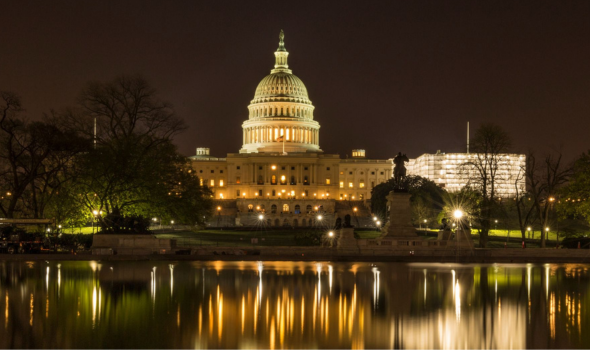- News
Recapping the Elections 2024
Elections and the municipal bond market. Who won, what do we know, and why does it matter?

Disclaimer: The following is intended to provide updates on current events and is not intended to provide legal advice or counsel as to any particular situation. The National Association of Bond Lawyers takes no responsibility for the completeness or accuracy of this material. You are encouraged to conduct independent research of original sources of authority. If you discover any errors or omissions, please direct those and any other comments to NABL.
By Brian Egan, Director of Government Affairs, NABL
Although several races remain undetermined as of Friday morning (11/8/2024), Tuesday’s election results will majorly shake up the agenda in Washington, DC next year. Republicans continue to move toward securing a unified government in which they will control the Senate and White House, and will likely hold onto control in the House of Representatives. Here’s a recap of where things stand. We will continue to provide analysis into the new year.
Election Results
The White House
Results came in on election night faster than many pundits initially predicted and certainly more quickly than they did in 2020. By early Wednesday morning, multiple news agencies had called Pennsylvania and Wisconsin for former President Donald Trump, all but securing his second term election victory. Vice President Kamala Harris conceded the election that afternoon without any indication that her team would contest results. President Biden has extended his invitation to work with the incoming Administration to ensure a smooth transition. Meanwhile, the Trump transition team now begins the massive task of preparing for the inauguration and its first year back in the White House.
The Senate
Republicans quickly picked up enough seats to regain control of the Senate. Senator-Elect Jim Justice (R-WV) was widely expected to easily win a seat currently held by retiring Senator Joe Manchin, an independent who caucuses with Democrats. The near certain outcome of the West Virginia race afforded Democrats no leeway to lose any additional seats, a reality that was shattered when Senator-Elect Bernie Moreno (R-OH) pulled an upset in unseating current longtime Senator Sherrod Brown (D). The Republican majority continued to grow with an added seat in Montana, currently held by Senator John Tester (D), and by flipping a seat in Senator Bob Casey’s (D) seat in Pennsylvania. Democrats narrowly held onto seats in Michigan, where Senator-Elect Elise Slotkin (D) will replace outgoing Senator Debbie Stabenow (D); and in Wisconsin, where Senator Tammy Baldwin (D) held onto her seat for a third term. We continue to await final results from Senate races in Arizona and Nevada― where Democrats narrowly lead in the current counts.
The House
About 25 races remain outstanding and neither party has yet to secure a majority. Republicans have thus far managed to flip three seats currently held by Democrats―two in Pennsylvania and one vacated by Michigan’s Senator-Elect Elise Slotkin (D)―adding to the narrow Republican majority held since 2023. It seems highly likely that Republicans will ultimately hold onto and may even slightly expand their majority in the House.
On the Agenda
From a debt ceiling to expiring tax provisions―the Trump Administration and Congress will have a number of items to tackle in the next Congress on top of their own priorities.
Leadership
First order of business for the next Congress will be selecting its new leadership. In February, Sen. Mitch McConnell (R-KY) announced that he would step down from his position of leading the chamber at the end of this session. Sens. John Thune (R-SD), John Cornyn (R-TX), and John Barrasso (R-WY) have emerged as the three main contenders to succeed McConnell. All three have extensive experience on the Senate’s Finance Committee and played key roles in the passage of the Tax Cuts and Jobs Act (TCJA) of 2017. The final outcomes of outstanding races will ultimately determine which party will lead the House. If Republicans prevail, as expected, current Speaker Mike Johnson (R-LA) will certainly bid to hold onto the gavel. His initial ascent came after a tumultuous selection process and an unprecedented maneuver to oust his predecessor, Rep. Kevin McCarthy (R-CA), in October 2023. Existing Democratic leadership is expected to largely stay the same, pending any fallout from campaign losses.
Sen. Mike Crapo is widely expected to rise to chair the Senate Finance Committee, and Rep. Jason Smith (R-MO) will likely stay as the chair of the House Ways and Means Committee. Both committees have primary jurisdiction over tax legislation and will likely dictate what the next Congress does to address the expiring TCJA provisions.
Election night losses for Sens. Sherrod Brown (D-OH) and John Tester (D-MT), as well as the downfall of former Sen. Bob Menendez (D-NJ) create vacancies in Democratic leadership on the Senate Banking Committee that will need to be filled. The turnover in party control, however, will likely lead to the Committee’s current ranking member, Sen. Tim Scott (R-SC), taking over as chair. On the House side, the retirement of Rep. Patrick McHenry (R-NC) leaves a vacant chair on the House Financial Services Committee. Several contenders will likely vie for that position, including Rep. Andy Barr (R-KY), Rep. Bill Huizenga (R-MI) and Rep. Frank Lucas (R-OK). Rep. Maxine Waters (D-CA) will likely continue to serve as lead Democrat on the Committee, which oversees regulation of financial markets.
Presidential Appointments
The new Administration will move quickly to fill more than 4,000 presidential appointee positions, including approximately 1,200 that require Senate confirmation. These appointments and nomination hearings will likely consume a large amount of bandwidth in the Senate early next year. Judicial nominations will also add significant hearing time to the Senate calendar.
A number of key appointments will have direct oversight over key areas of municipal bond policy, including a new Treasury Secretary, potentially a new IRS chief, and a turnover in party balance at the Securities and Exchange Commission (SEC).
Presidential administration’s typically have less control over independent agencies, such as the Federal Reserve, but President-Elect Donald Trump has bucked precedent and routinely emphasized his ire at the Central Bank’s policies in the past. It remains unclear how his administration will attempt to shape the Board of Governor’s decisions. The current Chair Jerome Powell has reiterated his plans to stay as the chief of the US’s monetary policy.
Debt Ceiling
The next Congress will immediately inherit a debt ceiling debacle. After a six-month impasse, Congress passed the Fiscal Responsibility Act in June of 2023. The measure suspended the federal debt ceiling until January 1, 2025. The Treasury Secretary will likely implement extraordinary measures late this year or early next year to float federal spending until a deal can be reached. Congress will need to address the ceiling before the federal government reaches its “X-Date,” the day on which the U.S. would exhaust its extraordinary measures. Due to the complexity and dynamics of federal accounting, properly estimating the “X-Date” is often an imprecise science.
Tax Reform
Many individual tax provisions of the TCJA will expire at the end of calendar year 2025. Regardless of electoral outcome, market participants had long widely expected action on tax reform next year. The Republican trifecta substantially increases the focus on extending temporary provisions of the TCJA, and possibly even lowering corporate taxes further below their current rate of 21 percent. As candidates, President-Elect Trump and Vice President Harris offered little insights into their views on tax-exempt municipal bonds. Both, however, outlined visions that would put pressure on Congress to find revenue raisers to offset the costs of high-ticket items.
The last time we faced a Republican trifecta, in 2017, the House of Representatives attempted to broadly repeal the tax-exemption for qualified private activity bonds (PABs). That same year, Congress succeeded in eliminating tax-exempt advance refunding bonds and rolling back sections of the code relating to tax credit bonds. Republicans are expected to release the outcomes of their tax study groups organized by House Ways and Means Chair Jason Smith (R-MO). These reports will likely offer the clearest early indication of where House Republicans stand on plans to address the TCJA cliff next year.
Full extension of the TCJA for another decade is estimated to cost about $3.8 trillion, assuming a baseline of no action on the sunset dates. Differing opinions exist, however, on how to account for the cost of extending temporary tax provisions. Senate leadership will likely preserve the filibuster, meaning the next Congress will almost certainly have to address tax policy within the confines of reconciliation rules.
Other areas of tax focus or next include what―if anything―to do on the state and local tax (SALT) deduction cap, whether to expand the child tax credit (CTC), and how to use the tax code to increase investment in affordable housing. President-Elect Trump also floated several other proposals that likely face steeper odds of enactment such as eliminating taxes on tips and overtime pay.
Surface Transportation
The next Congress will also have to address surface transportation programs ran by the Department of Transportation and other related agencies set to expire in 2026. The Infrastructure Investment and Jobs Act of 2021 authorized various programs for five- and seven-year terms. While not a priority for the first year of the new Congress, market participants should be aware that authorization for these programs requires action by the second half of the 119th Congress.
Need for Advocacy
Every election brings thousands of new faces, from elected and Senate-confirmed officials to congressional staffers. The continuous need to educate these new and returning faces on the importance of tax-exempt municipal bonds is great. The alignment of this new Congress with the high likelihood of tax reform only underscores why this task is especially pressing for the next Congress. Over the coming weeks and months, we will encourage NABL members and other market stakeholders to participate in our grassroots advocacy campaigns to protect the tax-exemption on municipal bonds.
In the meantime, here are the key points to remember. America was, is, and will continue to be Built By Bonds. The $4 trillion municipal market is the preferred method by which our communities finance the lion’s share of the nation’s infrastructure network. And any effort to limit or eliminate the tax-exemption on bonds would amount to a federal takeover of local decision-making and rip money from the communities that know their infrastructure needs best.
As always, please feel free to email advocacy@nabl.org with any of your thoughts, comments, questions, or concerns.
Save the Date: Essentials 2026
We are traveling to Austin, Texas next year to host The Essentials, our foundational conference for new public finance attorneys. Save the date for Wednesday, April 8 to Friday, April 10, 2026.
